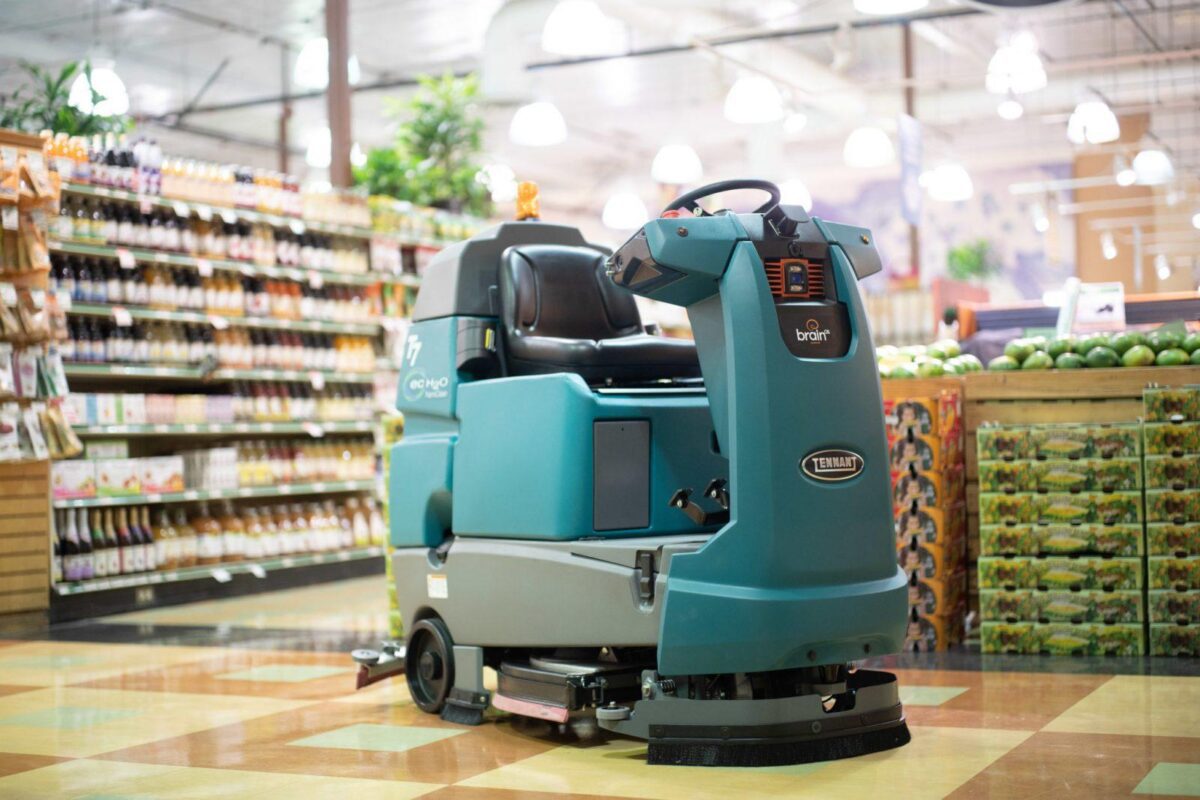Startups developing autonomous robots have seen their usage rise in grocery stores, warehouses and hospitals amid the COVID-19 pandemic.
As a result, these companies have naturally had to expand operations to meet demand.
Case in point: In the first quarter of 2020, Brain Corp. saw a 13 percent increase in average daily usage of BrainOS-powered robots in retail locations, according to Phil Duffy, the company’s vice president of product.

“We have seen a significant uptick in autonomous usage across the Brain-powered fleet as grocers and retailers look to enhance cleaning efficiency, and support workers during the health crisis,” Duffy said via email. “We expect this increase to continue as the value of automation comes sharply into focus.”
With cleanliness being the utmost priority during this pandemic, Brain Corp.’s robots offload the time-consuming tasks like floor cleaning and pulling heavy inventory carts, enabling workers to devote their time to other essential duties such as sanitizing high-contact surfaces, restocking, supporting customers and even taking a much-needed break, Duffy said. According to internal network data, Brain-powered machines will log more than 250,000 autonomous hours over the next month.
San Diego-based Brain Corp. has remained open as an essential business supporting other essential businesses such as grocery stores, Duffy said. The company’s employees who can work from home, are doing so, while members of the operations, deployment and technical support teams who need to do their job in the facility remain onsite and follow U.S. Centers for Disease Control guidelines on keeping a safe environment.
Zapping hospital germs
Employees at San Antonio-based Xenex, which makes full-spectrum UV Germ-Zapping Robots to eliminate harmful bacteria, viruses and spores that can cause hospital-acquired infections in a patient environment, have worked seven days a week to fulfill orders for its $125,000 disinfecting robots, CEO Morris Miller told Crunchbase News.
“I recently sent employees a note saying I am proud of them,” Miller said. “We took down more manufacturing space to produce more robots and spread them out. They are wearing face masks and social distancing. They take great pride in building these robots.”
Meanwhile, Xenex has ramped up hiring, steadily adding to its 125-person employee base, he said. That comes as hospitals and other entities in Italy bought 50 robots from Xenex last week to complement a purchase of 30 robots at the end of March, Miller said.
This is the similar kind of velocity he is seeing globally. The company is seeing interest now from medical offices and government agencies in the United States and overseas, as well as ambulatory centers and cruise lines.
“Since the beginning of the year our business is up 500 percent, and we are on track to do well over hundreds of millions in revenue this year,” Miller added.
Hotels are also adopting Xenex robots because there is such a “crisis in confidence with the public” that people are staying home, Miller said. The Xenex robots take minutes to disinfect, where other companies’ robots can take up to an hour, and that has assisted in alleviating customer fear, he said.
Restocking shelves
Simbe Robotics has also seen an uptick in interest in its platform as a result of COVID-19, as well as usage of its autonomous shelf-scanning retail robot called Tally.
As of now, Simbe has deployed Tally robots in more than 12 of the top 250 global retailers in the Americas, Europe, Middle East and Asia. In addition, Tally has navigated more than 50,000 miles in-store and analyzed over 1 billion product and shelf tags alongside customers and store teams, according to CEO Brad Bogolea.
Operations at the San Francisco-based startup continue to run smoothly, he said via email, but grocery partners have faced unprecedented spikes in customer demand for unexpected items such as instant cake mix and yeast.
“Our focus has been on helping them keep up,” he said. “Store teams have seen their work stream transform overnight from customer service providers to emergency essential workers. By taking over the essential, but time-consuming, task of auditing the shelves, Tally frees up 30 to 100 hours per week for human workers to focus on helping shoppers find the items they need in stores and keeping shelves stocked.”
Tally also collects real-time product location data so items are where customers expect them to be on shelves. As many retailers have limited the number of customers able to walk around the store at one time, Bogolea said timely, accurate data “is all the more crucial right now.”
“Additionally, as more grocers continue to hire temp workers who are unfamiliar with a store’s footprint, Tally’s data helps them quickly find specific products’ location on the sales floor, down to the aisle’s section number,” he added.
As for the future, Simbe’s inventory financing agreement with SoftBank Robotics is enabling the company to manufacture an additional 1,000 Tally units to deploy over the next year, Bogolea said.
Related: Startups Under Fire Amid COVID-19 Pandemic
The article Robot Manufacturers Work To Meet Demand Led By COVID-19 by Christine Hall first appeared on Crunchbase News.

